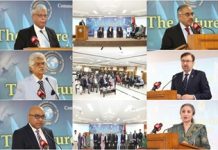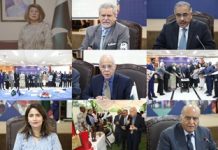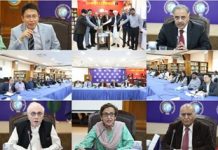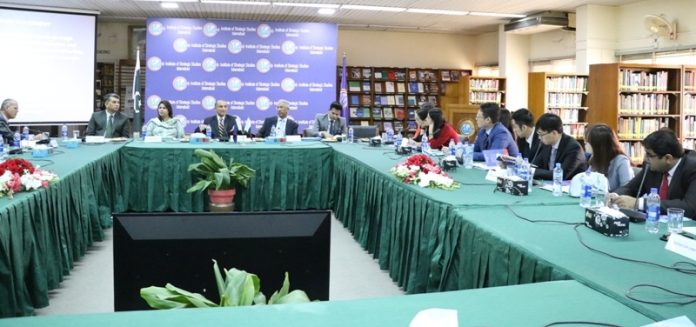Press Release
Roundtable
with
“Participants of trilateral ( Afghanistan, China, Pakistan) Diplomatic Workshop”
Oct 31, 2019
The Institute of Strategic Studies Islamabad (ISSI) hosted a roundtable with trainees at the Foreign Service Academy (FSA), at its premises today. The trainees comprised of Afghans, Chinese and Pakistanis young diplomats attending a trilateral workshop. The agenda for the session was to discuss different facets of Pakistan’s foreign policy, particularly its relations with Afghanistan and China.
Ms. Shahroo Malik, Research Associate give a brief overview of ISSI.
Dr. Talat Shabbir, Director China-Pakistan Study Center (CPSC) introduced the Center and then went on to outline Pakistan-China relations. He noted how friendship between the two countries has endured the geopolitical shifts. Even now, the relationship seems poised to withstand the stresses of an international system that remains in flux. He said that the China-Pakistan Economic Corridor (CPEC) is ushering in a new era of connectivity and prosperity in the region, and has helped establish much needed people-to-people contacts between Pakistan and China, and has thus added a newer and inclusive dimension to the bilateral relationship.
Ms. Amina Khan, Senior Research Fellow at ISSI, gave a briefing on Pakistan-Afghan relations. She said that Pakistan has and continues to aspire for a close bilateral relationship with Afghanistan not only because of close religious, cultural, ethnic and geographical ties, but primarily because whatever happens in Afghanistan has a direct impact on the state of affairs in Pakistan. Talking about the peace process, she said that Islamabad recognizes that there is only one path to attaining peace and stability in Afghanistan which is between the two principal stakeholders, namely the Afghan Government and Taliban. However, the outcome of the peace talks should not be the sole determining factor in the bilateral relations. Both countries should focus on other areas such as trade and energy so as to keep the relationship independent of the peace process.
Ambassador Aizaz Ahmad Chaudhry, Director General ISSI, described the role of think tanks in policy making. He said that the primary objective of any think tank is to influence the policy making process and shape policy agendas. Research is a methodology for achieving this. He went on to describe how think tanks are an important source for generating new ideas not only through research, but by facilitating dialogue, especially in an age where narratives play an important role. He said that Pakistan’s relations with both China and Afghanistan have immense potential and expressed hope that the diplomatic workshop process would continue in the future.
The remarks were followed by an interactive discussion.












